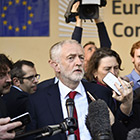
Belabored Podcast #166: Raises for Uber and Lyft Drivers, with Bhairavi Desai
Last week, New York established an important new pay floor for app-based drivers. Bhairavi Desai of the New York Taxi Workers Alliance joins us to talk about the victory.


Last week, New York established an important new pay floor for app-based drivers. Bhairavi Desai of the New York Taxi Workers Alliance joins us to talk about the victory.

Could a maximum wage gain traction in the United States?

Is it possible to love a torturer—even, or especially, if he is your most intimate relation?

Today, we are watched as never before, through surreptitious governmental data collection and through corporate profiles of our desires and habits. Yet we also divulge private matters aggressively, seeking freedom through publicity.

If the American left is serious about opposing a reactionary foreign policy that preserves unequal power relations, it should speak up for Taiwan.

Unemployment is at its lowest since 1969, yet the average American worker remains badly underpaid. Why?

We spoke with an immigrants’ rights activist from the Cosecha Movement about conditions at the border.

While gleaming shopping malls dot the urban landscapes of China, selling Nikes, Coach bags, and Prada shoes, a more authoritarian regime is making it harder for workers to organize or protest their low wages and poor working conditions.

“Traumatized, triggered, shocked.” An immigrants’ rights activist from the Cosecha movement describes the feeling among Central American migrants at the San Diego-Tijuana crossing.

Scandal at Facebook and the Amazon headquarters search charade have prompted renewed calls to break up big tech companies. But we need to go beyond trustbusting to rein in Silicon Valley.

America’s suburbs are no longer the white-picket enclaves of the popular imagination, thanks in large part to the Fair Housing Act of 1968. Yet the pathbreaking law remains far from delivering on its original promise. Can creative new litigation change that?

Marilynne Robinson’s latest essay collection What Are We Doing Here? reveals the limits of her restrained metaphysics.

By choosing to view Brexit merely as a domestic electoral challenge, Labour risks ignoring it as an immediate, real-world test of the party’s democratic and internationalist commitments.

Our Revolution’s political director assesses the left’s midterm achievements and discusses the organization’s plan to build a progressive mass movement and transform the Democratic Party.

What would community-owned, democratically controlled housing actually look like? From California to Germany to Uruguay, popular movements offer an inspiring range of answers.